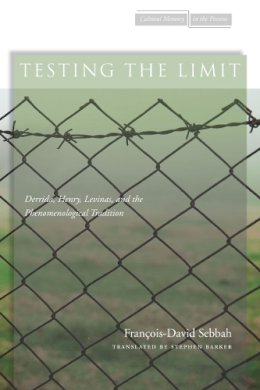12%OFF

Stock image for illustration purposes only - book cover, edition or condition may vary.
Testing the Limit: Derrida, Henry, Levinas, and the Phenomenological Tradition
François-David Sebbah
€ 43.99
€ 38.78
FREE Delivery in Ireland
Description for Testing the Limit: Derrida, Henry, Levinas, and the Phenomenological Tradition
Paperback. Through three different versions of phenomenological discourse (Derrida, Henry, and Levinas), this book explores the notions of excess and the excess of excess relative to conceptions of the self. Translator(s): Barker, Stephen. Series: Cultural Memory in the Present. Num Pages: 336 pages. BIC Classification: HPCF3. Category: (G) General (US: Trade). Dimension: 5817 x 3887 x 18. Weight in Grams: 458.
In exploring the nature of excess relative to a phenomenology of the limit, Testing the Limit claims that phenomenology itself is an exploration of excess. What does it mean that "the self" is "given"? Should we see it as originary; or rather, in what way is the self engendered from textual practices that transgress—or hover around and therefore within—the threshold of phenomenologial discourse? This is the first book to include Michel Henry in a triangulation with Derrida and Levinas and the first to critique Levinas on the basis of his interpolation of philosophy and religion. Sebbah claims that the ... Read more
Show LessProduct Details
Publisher
Stanford University Press United States
Number of pages
336
Format
Paperback
Publication date
2012
Series
Cultural Memory in the Present
Condition
New
Number of Pages
336
Place of Publication
Palo Alto, United States
ISBN
9780804772754
SKU
V9780804772754
Shipping Time
Usually ships in 7 to 11 working days
Ref
99-1
About François-David Sebbah
François-David Sebbah is Professor of Philosophy at the University of Compiègne in France and was Program Director at the International College of Philosophy in Paris. He is the author of Levinas: Ambiguïtés de l'altérité (2000).
Reviews for Testing the Limit: Derrida, Henry, Levinas, and the Phenomenological Tradition
"Sebbah's noteworthy book is perhaps the first sustained inquiry into the relationship between three thinkers in the French phenomenological tradition, two of whom are well known in the Anglophone world (Levinas, Derrida) and one of whom (Henry) is gradually better understood by English-speaking audiences. That all three are arrayed together in this study makes it a pioneering enterprise and one ... Read more
